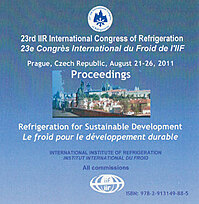
Document IIF
Amélioration du confinement des gaz fluorés dans l'Union Européenne : résultats du projet européen Real Skills.
Improving F-gas containment in the EU: results from the Real Skills Europe project.
Numéro : pap. ID: 285
Auteurs : COWAN D., BEERMANN K., CHAER I., et al.
Résumé
REAL SKILLS EUROPE is a voluntary awareness, information and training initiative that provides a vehicle for individuals and organisations in EU member states to share technical information and best practice in refrigerant containment. It offers a structured methodology for undertaking site surveys and assessing and minimising leakage potential, together with a certificated e-learning training scheme, software tools and guidance notes. A particular benefit to organisations in countries with less well developed RAC training schemes and late implementation of the F-Gas Regulations is that it can help them to achieve a more rapid and effective implementation, by learning from the experience of more advanced partner countries. The project is part-funded under the EU Lifelong Learning Programme and builds on a previous UK project (REAL Zero), that has proved effective in reducing refrigerant use at the sites that have been monitored. This paper describes the development of the EU project in the six partner countries and the results achieved to date.
Documents disponibles
Format PDF
Pages : 8 p.
Disponible
Prix public
20 €
Prix membre*
Gratuit
* meilleur tarif applicable selon le type d'adhésion (voir le détail des avantages des adhésions individuelles et collectives)
Détails
- Titre original : Improving F-gas containment in the EU: results from the Real Skills Europe project.
- Identifiant de la fiche : 30002420
- Langues : Anglais
- Sujet : Alternatives aux HFC
- Source : Proceedings of the 23rd IIR International Congress of Refrigeration: Prague, Czech Republic, August 21-26, 2011. Overarching theme: Refrigeration for Sustainable Development.
- Date d'édition : 21/08/2011
Liens
Voir d'autres communications du même compte rendu (569)
Voir le compte rendu de la conférence
-
Phasedown of high-GWP refrigerants accompanied ...
- Auteurs : TOMLEIN P., TOMLEIN M.
- Date : 13/06/2022
- Langues : Anglais
- Source : 15th IIR-Gustav Lorentzen Conference on Natural Refrigerants (GL2022). Proceedings. Trondheim, Norway, June 13-15th 2022.
- Formats : PDF
Voir la fiche
-
The review of the F-Gas Regulation: a state of ...
- Auteurs : ANTONINI L.
- Date : 10/06/2011
- Langues : Anglais
- Source : Green new deal - green economy. The latest technology in refrigeration and air conditioning: energy issues and climate change, new refrigerants, new European regulations, new plants. XIV European Conference: June 10-11, 2011, Milan.
- Formats : PDF
Voir la fiche
-
Introducing the R&D programs concerning CFC-rel...
- Auteurs : OHIRA T., YAMAGISHI K.
- Date : 23/10/1995
- Langues : Anglais
- Source : Stratospheric Ozone Protection for the 90's. 1995 International CFC and Halon Alternatives Conference & Exhibition. Conference proceedings.
Voir la fiche
-
Refrigerant leakage and containment: overview o...
- Auteurs : COWAN D., LUNDQVIST P., MAIDMENT G., et al.
- Date : 21/08/2011
- Langues : Anglais
- Source : Proceedings of the 23rd IIR International Congress of Refrigeration: Prague, Czech Republic, August 21-26, 2011. Overarching theme: Refrigeration for Sustainable Development.
- Formats : PDF
Voir la fiche
-
Containment of refrigeration installations: ref...
- Auteurs : HUCHET A., MORIO Y., CAZAURAN X., et al.
- Date : 21/08/2011
- Langues : Anglais
- Source : Proceedings of the 23rd IIR International Congress of Refrigeration: Prague, Czech Republic, August 21-26, 2011. Overarching theme: Refrigeration for Sustainable Development.
- Formats : PDF
Voir la fiche
